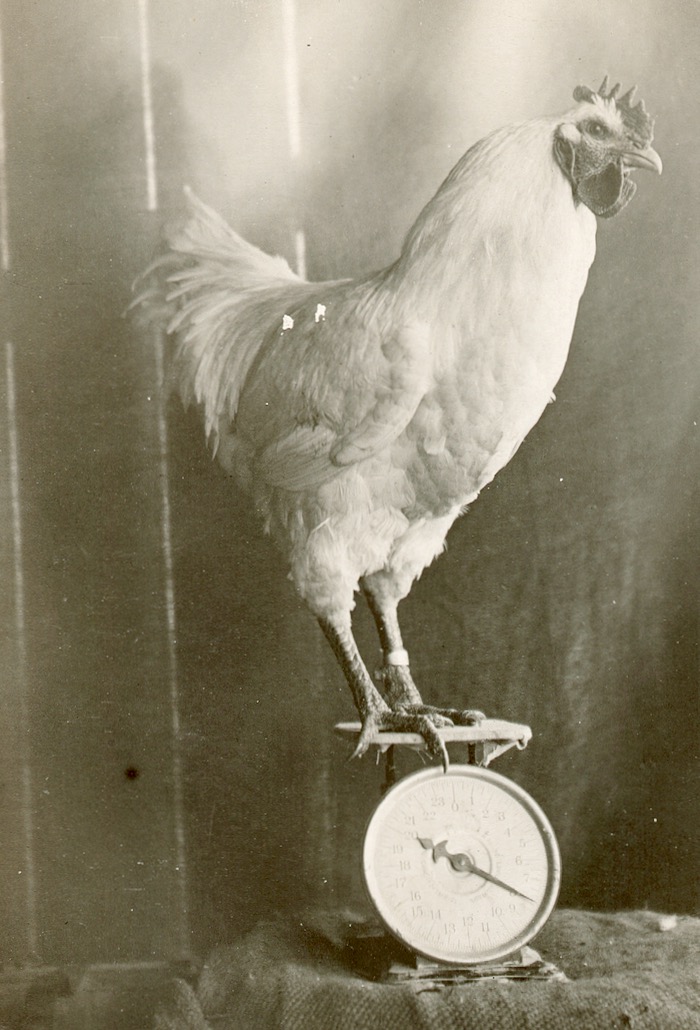Each week I field numerous private queries about ill hens. It’s nigh on impossible to come to a conclusive diagnosis in person, let alone via back and forth emails, but it’s always helpful because using clues from comb color to behavior I can help decide on a course of action. Sometimes it becomes a question of whether the animal is suffering. Chickens don’t express pain the way that we do. A listless hen that doesn’t eat can starve to death before you realize that she is that far gone. Deciding when to euthanize is very difficult.
A useful diagnostic tool is the simple scale. A hen that doesn’t eat will quickly lose weight. Conversely, a hen that has fatty liver disease, tumors, or internal laying, will collect weighty masses in her abdomen. Over the course of a couple of days, if there is a weight change, it will give you insight into what is going on inside of your chicken.
Or, you might just want to weigh your rooster for the bragging rights!


I am sure that none of my hens would be as well behaved as this rooster and just stand patiently on some scales. I do tend to try to gage their weight by picking them up though. I don’t know what they weigh but could tell if there was a weight change. That’s a great photo by the way.
Great photo! Eight pounds must have been a very respectable weight for a rooster back in those days, at least for a layer or dual purpose breed. I haven’t ever weighed any of my laying hens, because until just now when I read this post, I didn’t think there was a need for it. Now I know better. Some chicken folks around here use a kitchen scale with a flat tray weighing surface, and some use luggage scales with some form of bag or sling. What kind of scale do you use, Terry?
Any scale that registers under ten pounds works. I use a kitchen scale.
I always keep an eye on my girls weight especially if its very hot weather, another thing I check regularly is their crops to make sure there not compacted or squidgy. The other one’s I keep a close eye on are my broody hen’s when they are not having chicks as they can deteriorate quickly. Good post, great pic…..:)
Hmmm, I think I’m going to weigh my girls tonight. I think Scarlett is probably laying internally because she’s only given us 2 eggs in the past 3 months and one of those was a softie. She also is breathing heavily. My other Barred Rock feels lighter when I pick them up. They both were quite sick last year but Amelia has recovered fully and is laying almost daily. At least I think she’s recovered fully because it is so difficult to tell with a prey animal.
I’d brag if I had that rooster.
He *is* a fine looking rooster, isn’t he?
This conversation reminds of the joke:
“Hey dude! Do you know where I can get a henway?”
“what’s a henway?”
“Oh about two and a half pounds.”
That’s a very funny joke, Carlson. Anyway, I usually gauge my girl’s weight picking them up from time to time, if there’s any gain or sudden loss. So far their weights had been steady. The white leghorn seemed to be the heaviest and the biggest (but she’s also at the bottom of the pecking order). Two years ago, I had a mixed breed rooster that weighed at 5 lbs, beautiful bird but became the victim of a night prowling cat.
This has nothing to do with weight. But I am curious does heat affect chickens. It is going to be 100 here this week in North Carolina and your page got me thinking about how heat can play a role in taking care of chickens.
Heat is more dangerous than cold. I’ve written about how to keep your hens healthy in high temps on this FAQ. Take care!